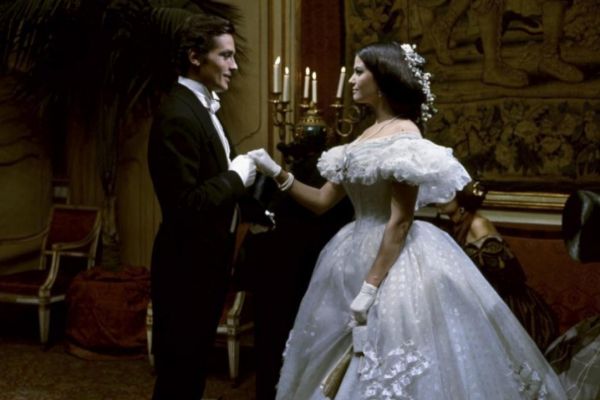The common place ensures that there are no cinematographic versions at the height of the great literary texts. As if the filmic and narrative languages lacked adherence. As if between them there was a no-man's land impossible to inhabit. The commonplace surely hides evidence (that any purpose of exact translation is doomed to failure), but it has also become an often unsustainable topic. Just think of The Welles process , adaptation of Kafka's work, in Apocalypse now of Coppola , update of The Heart of Darkness of Conrad , or Solaris de Tarkovski , variation on the homonymous piece of Lem , to refute the prejudice of the inability of cinema to illustrate a certain type of literature.
In the 50s of the last century, as a result of the political situation of the Cold War, Italian culture was very polarized. Ideologically close to communism, the neo-realist movement was then the privileged guardian of the status quo . Giuseppe Tomasi di Lampedusa , an aristocrat belonging to the Sicilian nobility, could only represent to his eyes an outdated sensibility and a class enemy. That motivated that his novel The cat was systematically rejected by publishers. Only the first intervention of Elena Croce , niece of the philosopher Benedetto Croce , and later of Giorgio Bassani, author of another inexcusable post-war work, The Garden of the Finzi-Contini , made it possible for Feltrinelli , then an incipient editorial, to publish the book in 1958, one year after the death of its author. It was a clamorous success.
So much so that, in 1963, one of the popes of European cinema, Luchino Visconti , managed to adapt the text with an international cast and overwhelming production costs. Visconti achieved a resounding and at the same time bastard work with El gatopardo . Superb from a technical point of view, and giving Burt Lancaster not only the role of his life, but one of the interpretative summits of film history, it is true that, if compared to the subtleties of the novel, the viewer assaults the feeling that in the filmed version the continent is more important than the content. The sumptuous still lifes of El gatopardo denote in any case scrupulous historical, social and psychological attention to objects, costumes and gestures. There is in the film an ethic of the terroir and an excessive love for beauty. The character played by Burt Lancaster forces us to think that dealing with history confirms pessimism, but that dealing with men does not necessarily force cynicism. And when the prince of Salina fatiguedly abandons a world that has already separated him as a useless mess, he leaves as legacy an insolent and superb joy to the only happy couple of Visconti's filmography, formed by the nephew Tancredi and the bourgeois Angelica . History has certainly been mocked. For a time, beauty and youth have rendered the square.
The cat leopard hides a famous political lesson. «It was called che tutto rimanga come è, bisogna che tutto cambi» . This is: "If we want everything to continue as it is, everything needs to change." Impudor or realpolitik , Lampedusa's thesis has made a fortune and has had a long journey in a country, Italy, one of whose national sports has been political subtlety and the art of living with the apparently contradictory. A reality that both in the novel and in the film managed to involve some of the most paradoxical characters of the national intelligentsia. Not surprisingly, the predominant sensation is that in El gatopardo the paradox is a second skin. Indeed, this double work accumulated a significant number of apparent contradictions. The first, for a conservative writer to write a revolutionary novel that showed that every revolution, by succeeding, ends up bringing a new conservatism. The second, that the novel seduced a billionaire editor, Giangiacomo Feltrinelli, who died while placing a bomb on a high-voltage line in Milan. The third, that the film adaptation was made by a director of noble origin, Luchino Visconti, count of Lonate Pozzolo, who loved opera and writers of his caste, but who voted for the Communist Party . And the fourth, even if it exceeds the Italian borders, that an old acrobat, Burt Lancaster, son of a mailman and a housewife from Ulster, will raise the uses and customs of the aristocracy of a Mediterranean island to the imperishable marble range. .
A final point, absolutely subjective and, as such, non-negotiable, because it refers to the most personal of the categories that exist: beauty. Never, as far as I remember, the beauty of the bodies reached such intensity as in the couple formed by Alain Delon and Claudia Cardinale in the film. It is a minor point, but not negligible, because at the end of the day, as Lampedusa warned, "it is not possible to be angry with who is certain that he will die." The only thing that we are given to hate is eternity, for eternity is the denial of beauty, which is, by definition, perishable.
-
Ricardo Menéndez Salmón is a writer. His last book is ' Do not enter meekly on that quiet night ' (Seix Barral).
According to the criteria of The Trust Project
Know more- literature
- culture
Literature Five essential books of the wise George Steiner
Literature: So the CIA 'Doctor Zhivago' infiltrated the USSR
A villain in Madrid George Steiner reads Lorca

